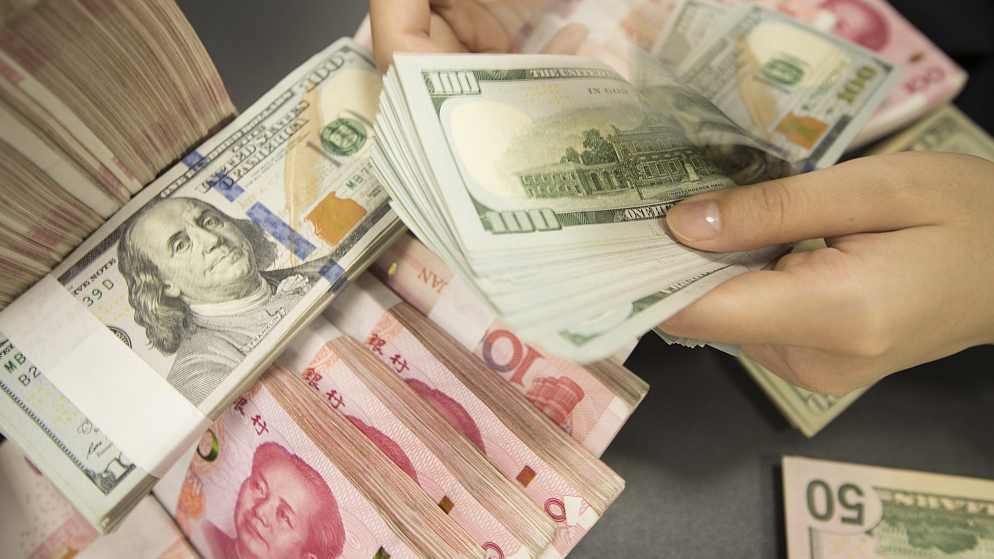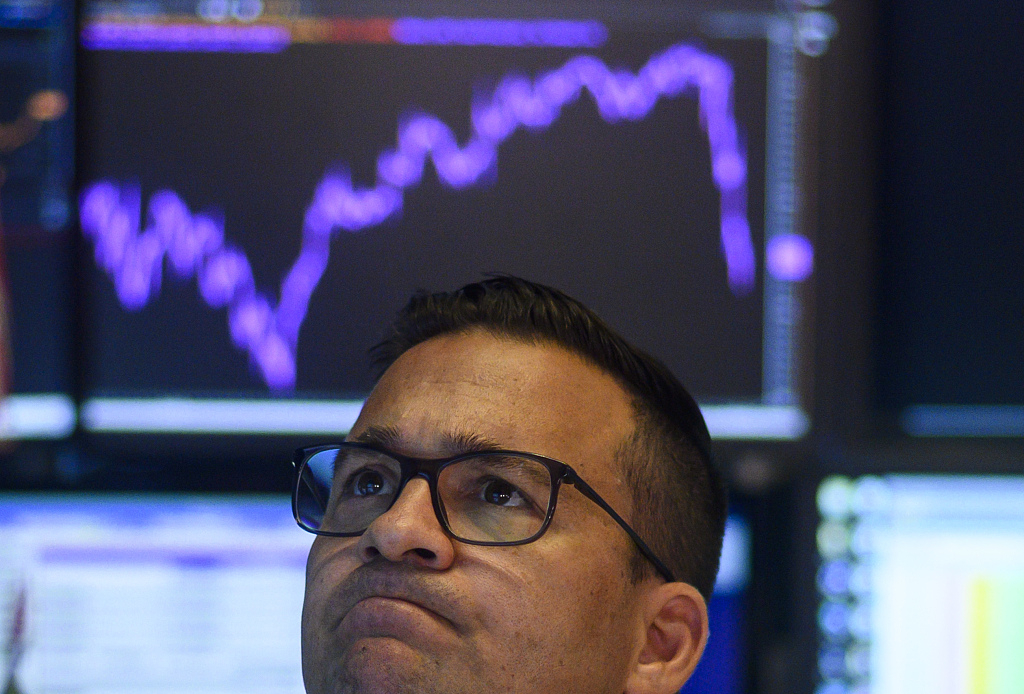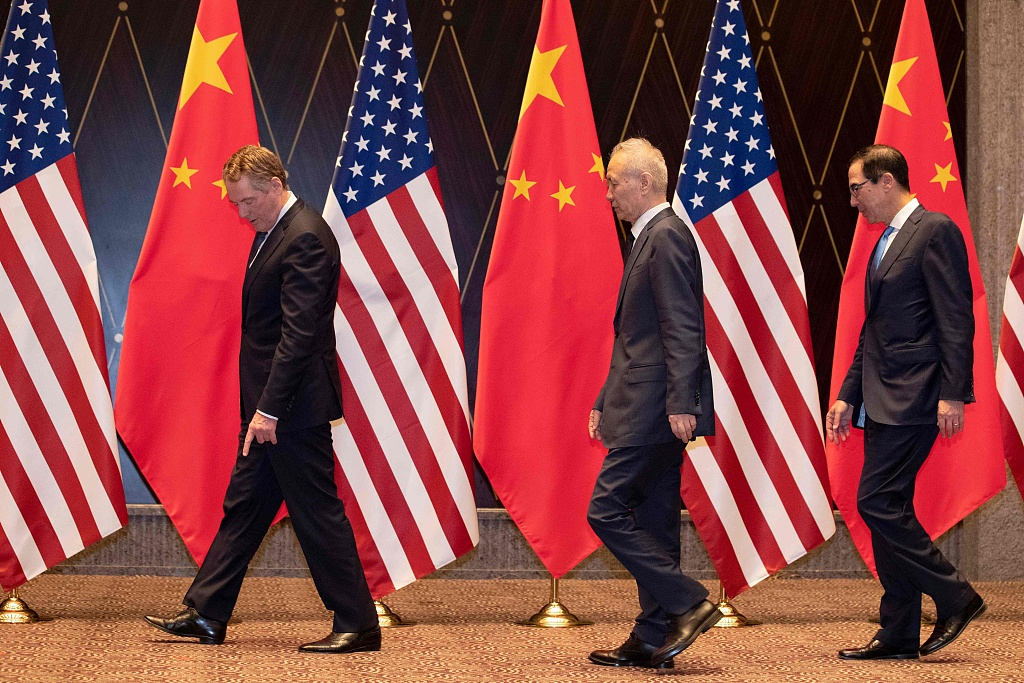

Editor's note: Ken Moak taught economic theory, public policy and globalization at the university level for 33 years. He co-authored a book titled "China's Economic Rise and Its Global Impact" in 2015. The article reflects the author's opinion, and not necessarily the views of CGTN.
U.S. President Donald Trump's trade war against China was "dumb" and got dumber when he raised the tariffs from 10 percent to 25 percent on 250 billion U.S. dollars' worth of products a few months ago. Threatening to impose a 10-percent tariff on the remaining 300 billion U.S. dollars of Chinese products effective September 1 for claiming China did not buy enough agricultural products from and stop shipping fentanyl to the U.S. might be the "dumbest."
The trade war and its first escalation had already slowed economic growth in the U.S., China and the world. Threatening 10 percent or higher tariffs on the remaining 300 billion U.S. dollars of Chinese products could send the global economy, including that of the U.S., into a recession because Trump might not only intensify it but also trigger a currency war.
China responded by allowing the market-driven value of the yuan to fall below the psychological threshold of less than 1 U.S. dollar to 7 yuan for the first time in over 20 years. Trump countered the move by labeling the country a "currency manipulator."
The label was more politically driven because it was meant to shore up support from his base and pacify the overwhelmingly anti-China Congress. His base is supporting his tariff policies because they used to produce the Chinese "imports." The U.S. Congress urged him to get "tough" on China, therefore lawmakers might support an agreement without total Chinese capitulation.

The New York Stock Exchange (NYSE) at Wall Street in New York City, August 5, 2019. /VCG Photo
However, the IMF pointed out in its July external sector report that the yuan is actually fairly valued and therefore neither it nor the World Trade Organization (WTO) would likely take any action against China. Indeed, no country or international organization recognized the U.S.'s criteria for currency manipulation – current account deficit of over 20 billion and trade value of over 50 billion U.S. dollars.
Still, the market-driven exchange rate disadvantaged the U.S. dollar, euro, Japanese yen and British pound because a lower-valued yuan causes a corresponding rise in the latter currencies' value. This irritated Trump because Chinese goods become relatively cheaper, potentially causing a surge in exports to America.
The American firms would take advantage of the de-valued yuan to import more goods from China, primarily because they are their own products which U.S. enterprises outsourced to the Asian giant for production. This might be the major reason behind his Treasury Department labeling China a currency manipulator.
Not only would U.S. exports decline, however, those in the EU and Japan could similarly be harmed, culminating in worsening the already fragile economies. According to the International Monetary Fund (IMF) and other supranational organizations, the trade war continues to slow down their growth rates to below 2 percent and falling.
To reverse the downward trajectory, the major economies might decide to depreciate their currencies which could lead to a currency war, thus repeating history.
In the late 19th and early 20th centuries, major economies implemented "beggar-thy neighbor" policies or manipulated their currencies to gain an export advantage. This not only wrecked the world financial system, but also distorting international trade because nations were trying to export as much as they could and, at the same time, preventing imports from entering each other's market.
The irrational and unsustainable practices resulted in the U.S. passing the Smoot-Hartley Act which imposed tariffs on a large number of imports. The trade partners responded with tit-for-tat tariffs, literary closing borders to international trade and investment. With domestic demand already falling, shutting out trade resulted in the Great Depression in the 1930s.

U.S. Trade Representative Robert Lighthizer (L), Chinese Vice Premier Liu He (C) and U.S. Treasury Secretary Steven Mnuchin (R) are at Xijiao Conference Center in Shanghai, July 31, 2019. /VCG Photo
It could be argued that Trump might have created his own "nightmare" by threatening a 10-percent tariff on the remaining 300 billion U.S. dollars of Chinese goods.
He is not only making the world mad at him but increasingly a number of Americans as well. The stock market prices plunged after his announcement with most of losses reported by major sectors – banks, technology, and farm equipment manufacturers, among others.
The tariff threat would hurt consumers the worst because the excise taxes will be imposed on "necessities" such as shoes, clothing, computers, iPhones, and other things. The average consumer is already up to his/her "eyebrows" in debts, a 10-percent or higher hike in prices could stir financial woes because almost half of all Americans cannot pay for unexpected expenses of over 400 U.S. dollars. Most of these working-class Americans are Trump supporters.
As if things are not bad enough, they might be getting worse for the U.S. and Trump because China stopped buying all of its agricultural products, hitting his major supporters.
The Chinese policy might have just "killed" the farm sectors because China is their largest customer. Since U.S. farmers are already in a state of financial crisis, Chinese government's tit-for-tat decision could further stress the farmers' financial woes.
In escalating the tariff war nearing its full-blown stage for political reasons and trying to pressure China into "capitulation," Trump might have "buried" himself and taken the U.S. economy with him. No president has ever won a second term when the economy tanked under his watch.
Trump should "shift gear" and do the right thing, compromise his untenable position of forcing China into capitulation with tariffs. The excise taxes only hurt Americans and might in fact have done China a favor.
The trade war prompted China to be more creative in policy formulation and implementation. For example, the Asian giant is busy promoting closer relations with other countries with initiatives such as the Belt and Road. The process won China many friends around the world and sustained its target economic growth rate of 6-6.5 percent annually.
(If you want to contribute and have specific expertise, please contact us at opinions@cgtn.com.)

Copyright © 2018 CGTN. Beijing ICP prepared NO.16065310-3
Copyright © 2018 CGTN. Beijing ICP prepared NO.16065310-3